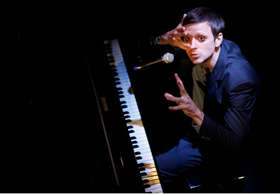Julian Neary joins a long line of Irish men at odds with their families, especially their fathers, and their nation. Like James Joyce’s Stephen Dedalus, Brian Friel’s Gar O’Donnell, and even Pat McCabe’s Francie Brady, Scannell’s Neary struggles to internalise and replicate the oppressive culture his adoptive parents promote. Born in the 1980s, and raised by a conservative rural family stuck in the 1950s, Julian feels completely out of time and place.
As a young child, the pressure to mimic family norms and interests is dodged by a compulsion to repeat music by ear. His father questions the sincerity of his talent, even as his quietly suffering mother suggests “You have to pretend to be something before you can be anything.” Faking illness to skip school, he avoids Irish language and traditional music to absorb the mannerisms of Columbo and Jimmy Stewart, Billie Holiday and Morrissey, occasionally performing for his mother in secret. However it’s Aoife, his adoptive sister, who provides the greatest personal sustenance of all.
Scannell sits at a grand piano for most of this performance, once backing off when the memory overwhelms. He relays the troubled life of his character to a slightly warmer accompaniment, telling stories more than singing. Emotions ripple in shadow and light across his face; the daubs of black under-eye make-up always reminding us of his brooding theatricality. Only occasionally does he glance at the rectangular mirror that hangs overhead to his right, flashing his five fingers into the air like a fright-wig. This is a personal, artistic and cultural history, but it is also a performance.
Having evoked the staid atmosphere of his childhood, Neary cynically recalls the promise of the noughties. Money and drugs abounded, and even his mother collected ‘Vogue.’ The crisis in familial and cultural reproduction to which Neary always seemed so sensitive is succeeded by other challenges to human authenticity: cloning, bodily enhancement and celebrity without roots.
In many ways, Neary’s overview subverts the presumed significance of recent history. “Then 9/11, and the tsunami happens,” he breezes, giving more time to processing Aoife’s emigration to Manchester. Eventually joining her, Neary learns that she is engaged, and the fire in their relationship has faded. Sex doesn’t help, ultimately seeming more symptomatic than passionate.
The chronicler leads us into fantasy territory when he depicts the steady disintegration of Irish life: the spire topples on O’Connell Street and there are road-blocks on the Ring of Kerry. People lack direction, with “suicides like raindrops, they fall in their hundreds.” This, too, is Aoife’s fate.
Bemoaning the Republican dream in the face of crass greed and consumerism, Neary incants at different stages “Tiocfaidh ár lá and the day came and we spent it all in one shop…we’re back where we started.” Despite being very critical of Irish life, from its conservative to capitalist incarnations, Neary doesn’t propose an alternative vision of the world. The citizen-artist is both crippled and propelled by the “tapestry of voices” that surrounds him. On one level he craves originality, and on another he forges meaning through copying Irish and international influences, however he might disrupt the template in the process. It’s a double-edged sword, the outcome of which is unclear for Neary and those of whom he speaks and indeed to.
 Scannell’s performance is compelling and technically precise. He moves effortlessly from playing the piano, to exacting impressions, to narrating Neary’s story. In this, he is both Neary and his interlocuter. Under Tom Creed’s bracing direction, the performance is pitched as if one of Neary’s cabaret style performances in the present. This gives the production, which has had numerous outings since 2007, a slick edge, although it doesn’t always communicate the fury and frustration that Neary is said to have experienced. When Scannell steps away from the piano, or when his rendition is interrupted by flashing or full lighting, we get closer to the man behind the performance.
Scannell’s performance is compelling and technically precise. He moves effortlessly from playing the piano, to exacting impressions, to narrating Neary’s story. In this, he is both Neary and his interlocuter. Under Tom Creed’s bracing direction, the performance is pitched as if one of Neary’s cabaret style performances in the present. This gives the production, which has had numerous outings since 2007, a slick edge, although it doesn’t always communicate the fury and frustration that Neary is said to have experienced. When Scannell steps away from the piano, or when his rendition is interrupted by flashing or full lighting, we get closer to the man behind the performance.
While Mimic offers some entertaining impressions, it is foremost a deeply dark, angry take on Ireland’s recent history. Neary is doubtful of his country, his people and his culture. Compelled to mimic, he makes meaning only by repetition. This enables the transmission of culture, but it also holds him and his country back from alternative possibilities. How to move beyond this deadlock is the incredibly daunting but timely question that this affecting production poses.
Fintan Walsh